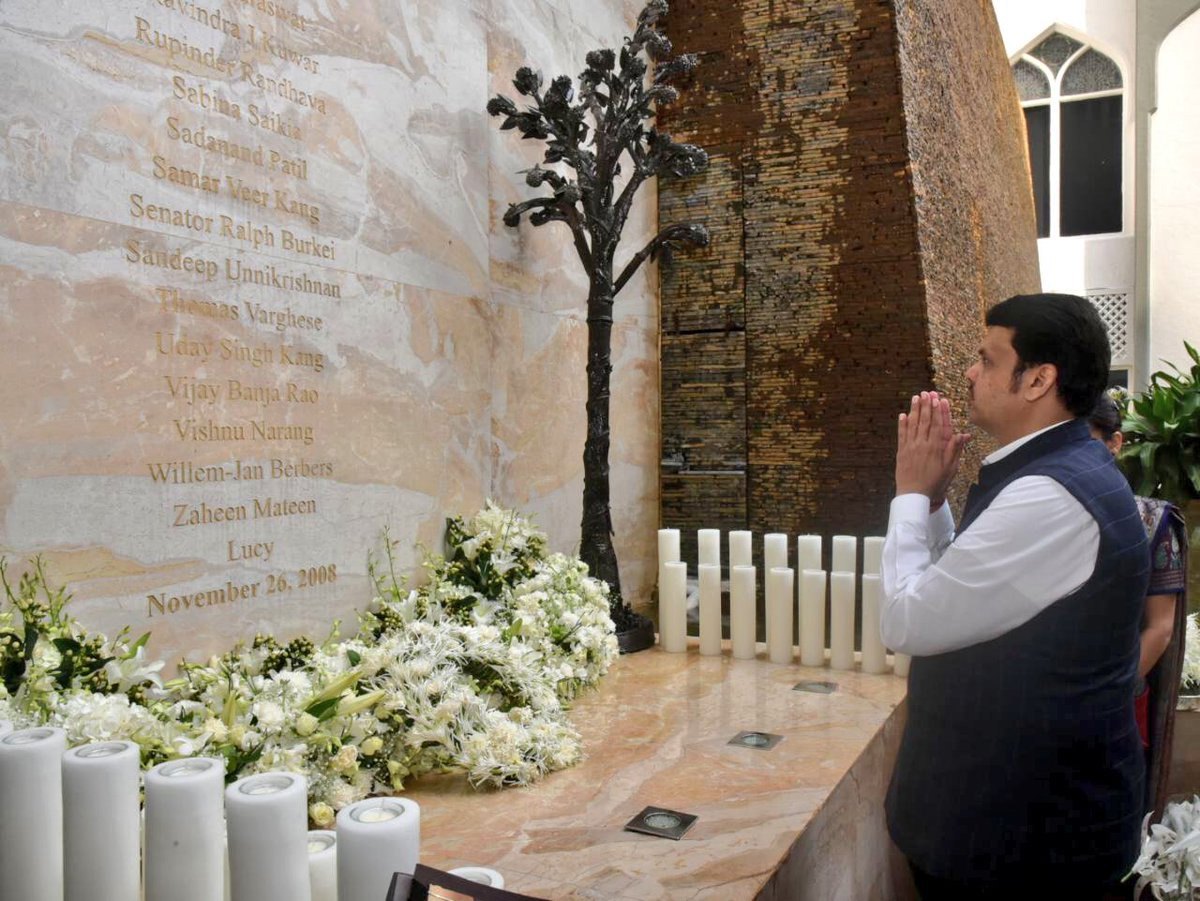
MUMBAI, Nov 26:
Floral tributes were paid Monday to those who laid down their lives while fighting Pakistani terrorists who had attacked the metropolis on this day 10 years ago.
Maharashtra Chief Minister Devendra Fadnavis was among the dignitaries who paid homage at the 26/11 police memorial site at the Mumbai Police Gymkhana in south Mumbai.
“I pay homage to the brave policemen who fought for Mumbai’s safety and laid down their lives for us on 26/11. We are proud of them and we will strive hard for the safety and security of our state,” Fadnavis said.
Governor Ch Vidyasagar Rao, Maharashtra Police Chief Datta Padsalgikar and Mumbai Commissioner of Police Subodh Kumar Jaiswal also attended the ceremony.
Family members of the policemen who lost their lives during the attacks were also present during the ceremony.
On November 26, 2008, 10 Pakistani terrorists arrived by sea route and opened fire indiscriminately at people killing 166, including 18 security personnel, and injuring several others, besides damaging property worth crores.
The then Anti-Terrorism Squad (ATS) chief Hemant Karkare, Army Major Sandeep Unnikrishnan, Mumbai’s Additional Police Commissioner Ashok Kamte, Senior Police Inspector Vijay Salaskar and Assistant Sub-Inspector (ASI) Tukaram Omble were among those killed in the attack.
The attacks had begun on November 26 and lasted till November 29.
The Chhatrapati Shivaji Maharaj Terminus, the Oberoi Trident, the Taj Mahal Hotel, Leopold Cafe, Cama Hospital and the Nariman House Jewish community centre, now renamed Nariman Light House, were some of the places targeted by the terrorists.
Ajmal Kasab was the only terrorist who was captured alive. He was hanged four years later on November 21, 2012.
Paying his tributes, Jaiswal tweeted: “I offer my heartfelt tribute to the ones who put Mumbai first, till the very end”.
The Mumbai Police too posted a message on its Twitter handle which read, “Remembering those who put the nation before themselves. And our salute to the city whose resilience always made its people stronger”.
Speaking to media, Salaskar’s daughter Divya said nothing could compensate for the pain the incident had caused.
“The whole city remembers this day very painfully. Ten years down, we have came a long way but the pain is very much the same. When you lose a loved one like a father or a husband, there is nothing to compensate for that kind of pain,” Divya said.
She added that the city was safer and there was more awareness among people.
Radhakrishna Vikhe Patil, Leader of Opposition in the Maharashtra Assembly, after paying tributes, praised the Mumbai Police but pulled up the state government for lapses.
He said the Ram Pradhan Committee, constituted by the then government to probe the shortcomings that led to the 26/11 terror attack, had recommended the setting up of a protocol under an internal security committee.
This protocol is yet to be prepared and the internal security committee has never met in the past four years (since the BJP-led government came to power in the state), Vikhe Patil pointed out.
“Coastal police stations were announced by the state government, but nothing has been done about them in the last four years,” the senior Congress leader said, adding that coastal policing should be a top priority.
Vikhe Patil said the government should emphasis the need for technology and greater initiative in intelligence. (PTI)
Senior Nationalist Congress Party (NCP) leader Ajit Pawar said the safety of people was of utmost importance and there could not be any compromise with that.
He said he did not want to draw comparisons between the previous and the current government, but made it clear that safety of the common man was of utmost importance.
Meanwhile, former Mumbai Police Commission M N Singh said Pakistan was a permanent enemy of India and claimed that as long as the Army and the Inter-Services Intelligence (ISI) were in a position of power in the neighbouring country, they wouldn’t allow the relationship between the two countries to normalise.
He said Pakistan was a constant threat to India’s security and had an agenda of violence against India.
Railway authorities, led by Central Railway general manager D K Sharma, laid wreathes on the 26/11 memorial at Chhatrapati Shivaji Maharaj Terminus, one of the targets of the terror attack. (PTI)

